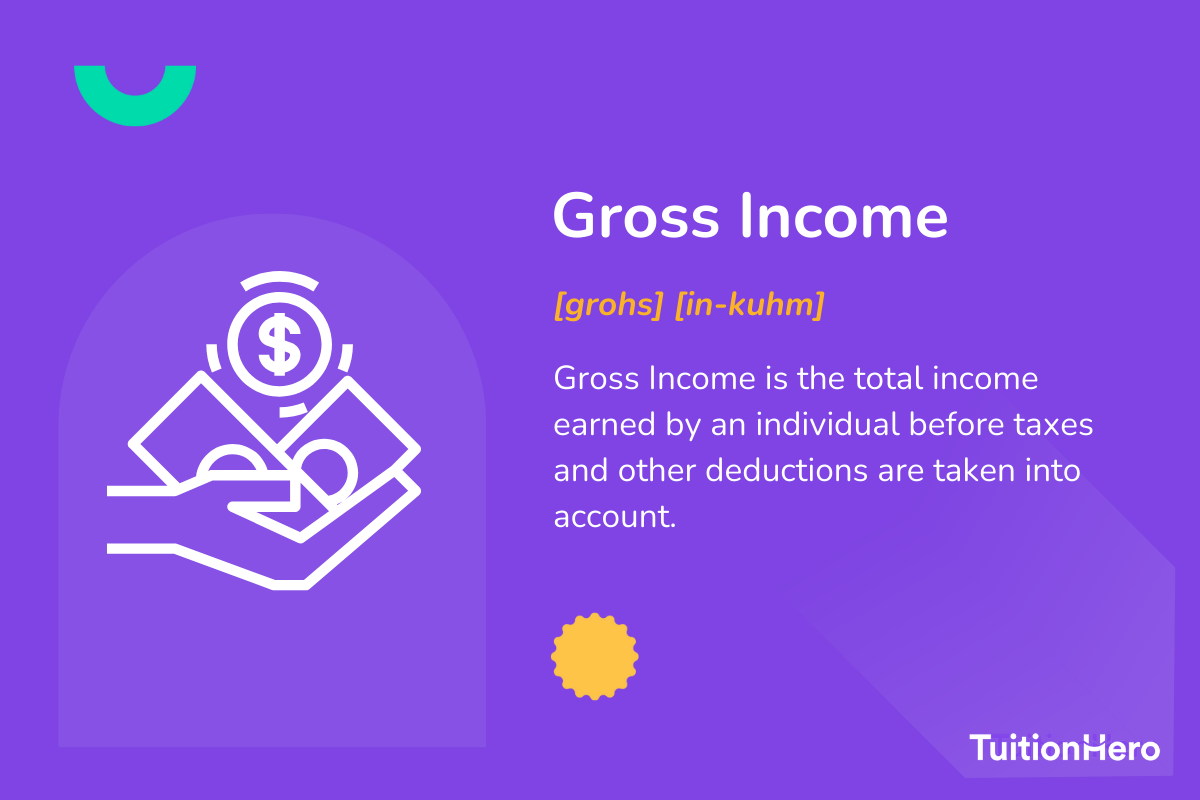Advertiser Disclosure
Last update: November 17, 2024
5 minutes read
What is Gross Income?
Do you know how gross income affects college funding? Learn how it shapes financial aid, loans, and scholarship opportunities.

By Derick Rodriguez, Associate Editor
Edited by Brian Flaherty, B.A. Economics
Learn more about our editorial standards



By Derick Rodriguez, Associate Editor
Edited by Brian Flaherty, B.A. Economics
Learn more about our editorial standards
In today's world, understanding your finances is more crucial than ever. Knowing the difference between gross income, net income, and other financial metrics matters because it affects everything from loan applications to financial planning. In this blog, we'll explore the details of gross income. Also, we’ll learn how understanding this concept can affect students and parents looking into options for student loans.

Key takeaways
- Your gross income affects how much you have to pay in taxes and if you can get a loan
- Understanding your discretionary income can help plan effective student loan repayments
- Interest accumulation plays a key role in the long-term cost of student loans
What is gross income?
Gross income is the total amount you earn before any money is taken out for taxes, expenses, or other deductions. It's a simple way to see how much money you make overall.
Whether you're an employee, a freelancer, or a business owner, your gross income is the sum total of your wages, salaries, bonuses, and other forms of earnings before any expenses. This number is important for many reasons.
Firstly, if you’re an employee, your gross income is used to figure out the amount of income tax you have to pay. The rules are a little different for freelancers and businesses, who typically pay income tax on their net income (which is determined by subtracting appropriate expenses from gross income). If you’re not sure whether you count as an employee for tax purposes, reach out to a tax professional for help.

Secondly, lenders check your gross income when you want to get loans, like private student loans or refinancing. Here are a few components that typically make up gross income:
- Wages and salaries: Money you earn from your job.
- Bonuses and commissions: More earnings based on performance.
- Investment income: Money earned from investments, like dividends or interest.
- Rental income: If you own property and rent it out, this is included in your gross income.
Understanding discretionary income
When dealing with student loans and how to pay them back, discretionary income is a crucial term. It's the money you still have after covering important expenses like taxes and basic living expenses.
It's a number that's calculated by subtracting your expenses from your gross income. Understanding how much money you have left after paying for necessary things helps you decide how to pay back your student loans and plan for future expenses.
It's also important for figuring out if you qualify for repayment plans based on your income and family size.

TuitionHero Tip
Remember, discretionary income is not the same as net income. Net income is a tax term that’s most important for freelancers and business owners. Discretionary income, though, is a personal finance term that’s important for everyone.
The effect of interest on student loans
Understanding interest accumulation
Interest is a critical concept to grasp when dealing with student loans. It’s the cost of borrowing money, and it accumulates over time, affecting the total amount you’ll have to repay.
Strategies to minimize interest payments
Effective strategies to minimize the effect of interest include making payments while still in school or choosing repayment plans that allow you to pay more toward your principal amount earlier. Knowledge about expected family contribution and how it influences your loan options is also pivotal.
Planning for college expenses
Handling college expenses requires careful financial planning. Other than just tuition, you need to think about books, housing, and personal expenses.
There are different ways to manage these costs. You can look into scholarships with TuitionHero and learn about financial aid options. Understanding how student loans are paid out can also help you know when you'll get the funds.
Creating a budget is a useful tool to keep track of your spending and find areas where you can save money. A budget will guide your finances during college, making sure you live within your means and still save for the future.
Compare private student loans now
TuitionHero simplifies your student loan decision, with multiple top loans side-by-side.
Compare Rates
Dos and don'ts of managing your gross income
When it comes to managing your gross income effectively, especially in the context of planning for college or repaying student loans, striking the right balance between saving, spending, and investing is key. Here’s a quick guide to help you understand this important part of personal finance.
Do
Track your income and expenses regularly.
Set aside a portion for emergency savings.
Use your gross income as a basis for creating a realistic budget.
Consider investment options for long-term growth.
Look for advice on managing debts effectively.
Don't
Ignore tax planning and potential deductions.
Overspend on non-essential items that could compromise your budget.
Underestimate the importance of saving for retirement, even at a young age.
Forget to review and adjust your financial plan periodically.
Hesitate to ask for professional financial advice when needed.

Advantages and disadvantages of understanding gross income
Understanding your gross income is a key element of smart financial planning, greatly affecting your ability to make well-informed decisions regarding savings, investments, and debt management.
- It provides a clear picture of your financial health, helping to set realistic goals.
- Ensures accurate tax filings and maximizes potential refunds or credits.
- Helps effective management of debts, including student loans.
- Boosts your ability to make informed investment and savings decisions.
- Makes planning for retirement easier, even from an early age.
- Without proper knowledge, you might overestimate your disposable income, leading to poor financial decisions.
- It can be complex to understand, especially if you have multiple income streams.
- Mismanagement based on gross income figures can lead to financial strain, like under-saving for emergencies or retirement.

Why trust TuitionHero
At TuitionHero, we provide helpful information for students and parents about college finance. We want to make it easier for you to make smart choices about college expenses. Knowing your total income is important because it affects your chances of getting financial aid, like student loans and scholarships. We connect you with loan providers tailored to your financial situation. With TuitionHero, managing money for college becomes simpler and easier.
Frequently asked questions (FAQ)
Your gross income is a key factor in the scholarship application process. Many scholarships have financial need criteria, where they consider an applicant's income to make sure the funds are given to those most in need. By providing a clear picture of your financial situation, based on your gross income, we can help you identify scholarships you might be eligible for, increasing your chances of receiving aid.
Yes, reporting your gross income on the Free Application for Federal Student Aid (FAFSA) is necessary. Your gross income is used as a basic input to help calculate your adjusted gross income (AGI).
This metric helps determine your Expected Family Contribution (EFC), which in turn influences the amount of federal aid you might get. Our FAFSA assistance tools at TuitionHero are designed to simplify this process, helping you make sure your application is filled accurately and efficiently.
Understanding your gross income is beneficial when considering student loan refinancing. Lenders usually look at your income as part of their decision-making process to assess your ability to repay the loan.
If your gross income demonstrates financial stability and the potential for repayment, you may qualify for lower interest rates and better loan terms. Our marketplace tools at TuitionHero can connect you with refinancing options that match your financial profile.
Final thoughts
Knowing your gross income well is important for managing the financial side of going to college. It affects whether you can get scholarships or financial aid, and helps you decide about taking out student loans or using credit cards.
With TuitionHero, we're here to help you understand college finance better. We give you the information and tools you need to make smart choices about your college funds. Check out our resources to learn more and make confident decisions for college and beyond.
Source
Author

Derick Rodriguez
Derick Rodriguez is a seasoned editor and digital marketing strategist specializing in demystifying college finance. With over half a decade of experience in the digital realm, Derick has honed a unique skill set that bridges the gap between complex financial concepts and accessible, user-friendly communication. His approach is deeply rooted in leveraging personal experiences and insights to illuminate the nuances of college finance, making it more approachable for students and families.
Editor

Brian Flaherty
Brian is a graduate of the University of Virginia where he earned a B.A. in Economics. After graduation, Brian spent four years working at a wealth management firm advising high-net-worth investors and institutions. During his time there, he passed the rigorous Series 65 exam and rose to a high-level strategy position.
At TuitionHero, we're not just passionate about our work - we take immense pride in it. Our dedicated team of writers diligently follows strict editorial standards, ensuring that every piece of content we publish is accurate, current, and highly valuable. We don't just strive for quality; we aim for excellence.
Related posts
While you're at it, here are some other college finance-related blog posts you might be interested in.
Shop and compare student financing options - 100% free!

Always free, always fast
TuitionHero is 100% free to use. Here, you can instantly view and compare multiple top lenders side-by-side.

Won’t affect credit score
Don’t worry – checking your rates with TuitionHero never impacts your credit score!

Safe and secure
We take your information's security seriously. We apply industry best practices to ensure your data is safe.
Finished scrolling? Start saving & find your private student loan rate today
Compare Personalized Rates




